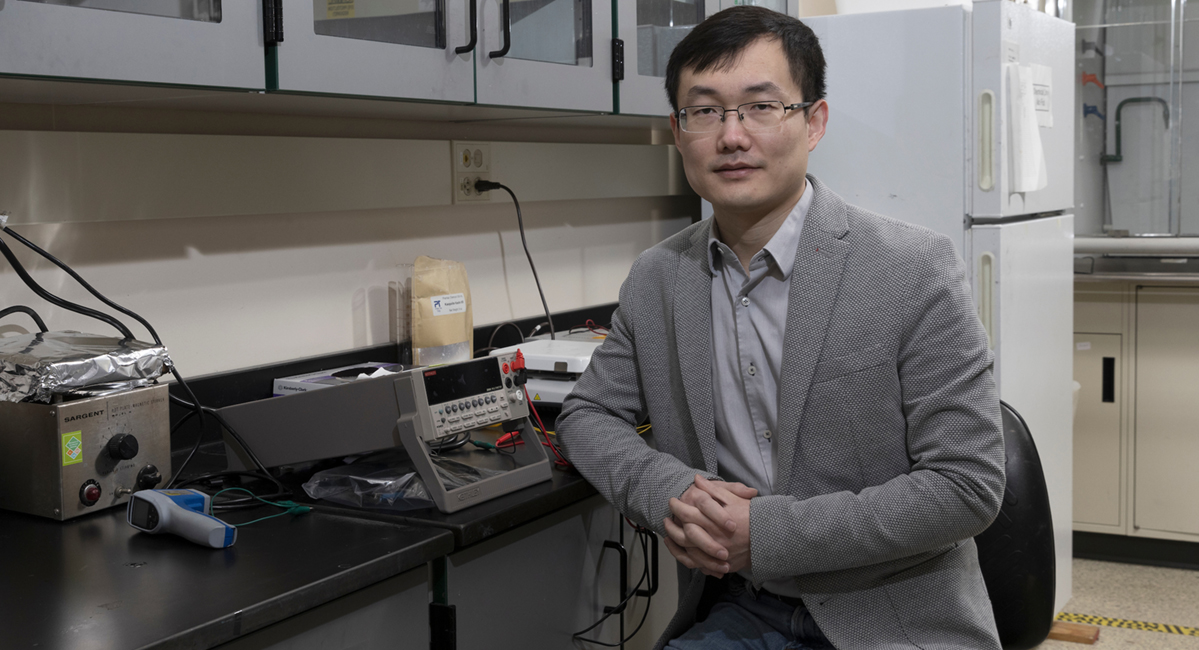NSF CAREER Award to fund research into liquid metal for soft electronics
Watson College's Pu Zhang seeks super-stretchable solutions for wearable electronics

Soft electronics that can bend or stretch without breaking have become an important part of the technology market, particularly in wearable electronics, soft robotics and bioelectronics for medical usage.
One critical challenge is finding new materials that are highly conductive like metals yet remain super-stretchable, so researchers have sought solutions from a variety of different angles.
Assistant Professor Pu Zhang, a faculty member in the Department of Mechanical Engineering at Binghamton University’s Thomas J. Watson College of Engineering and Applied Science, has an intriguing solution to the problem: Use liquid metal networks in rubber that can deform easily while remaining highly conductive.
Zhang recently received a five-year, $565,337 NSF CAREER Award to fund his studies. A CAREER grant supports early-career faculty who have the potential to serve as academic role models in research and education.
The research will build on experiments that Zhang already has done on gallium–indium alloy, which has a melting point around 15 degrees Celsius (60 degrees Fahrenheit). That means it is liquid at room temperature. Using a new fabrication process Zhang developed at Binghamton, he was able to produce liquid metal network composites with an ultra-low amount of liquid metal, but still maintain high electrical conductivity.
Ultimately, the goal would be to use an alloy of gallium, indium and tin with a melting point of minus 20 degrees (minus 4 Fahrenheit) that could function during winter in colder climates.
“We’ve achieved over 10-fold reduction of liquid metal consumption, compared to similar materials developed by others. So our new material is much cheaper and lighter-weighted,” Zhang said. “Existing technologies can make liquid metal fibers that are thicker than 100 microns, while we can make them 10 times thinner at 10 microns.”
For size comparison, a micron (or micrometer) is one-millionth of a meter. A human red blood cell is about 8 microns wide. So that’s very small, but large enough to carry electricity as needed to power flexible devices.
As a mechanical engineer, Zhang’s previous research focused more on the structural applications of liquid metal, creating what he called “the first liquid metal lattice in the world” that could be utilized on a macro scale for space exploration and other situations where metal needs to absorb a shock. Inspired by other research at Binghamton, he shifted to electronics for this project.
“The major reason is that the University is very strong in electronics research — we have two research centers on electronics, and liquid metal has a lot of promising applications there,” he said.
With the NSF funding, Zhang and his lab can further develop the manufacturing of liquid metal network composites, purchasing equipment and funding PhD students to aid in the research.
“We are also planning to develop some theories on how to predict the electrical conductivity of this material under large deformation,” he said.
On the education side, the CAREER project will establish a soft electronics inventor lab for undergraduates, giving them the raw materials such as rubber compounds, silver pens and liquid metal so they can utilize their classroom lessons in the real world. Zhang and his lab also will start a wiki site focused on liquid metal composites that will be open for editing by colleagues worldwide, sharing their knowledge and advancing the research.
This project is Zhang’s first attempt at a CAREER Award, and he already started early research into some of the questions in 2020. Much of the pilot study was done by his graduate students, Zihan Liu, Jiexian Ma and Quang-Kha Nguyen.
“I was very glad that a few years of effort finally was recognized by the engineering community,” he said, “I am looking forward to more interesting outcomes from this project and collaboration with Watson colleagues who work on soft electronics.”
